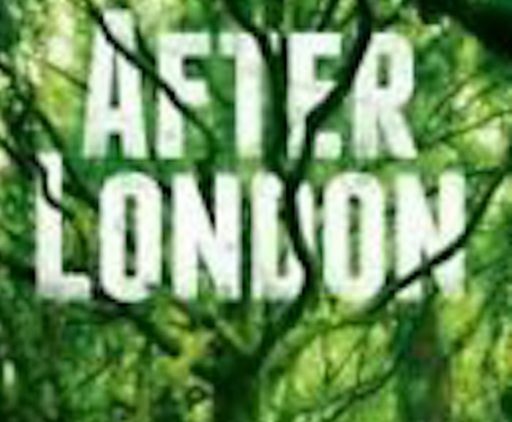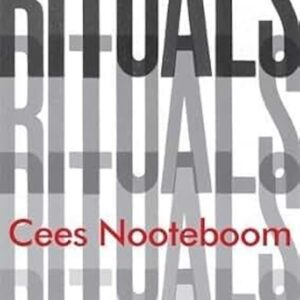I’ve just finished After London; or, Wild England by Richard Jefferies, published in 1885. The story follows the protagonist, almost the only significant human character, Felix Aquila. The jacket copy declares that this book “pioneered the post-apocalyptic genre of science-fiction,” and cites a critic calling it the most beautiful Victorian novel. The story is indeed post-apocalyptic. But the correct term for this fiction is romance. Romance means quest. To be a little more precise, romance is digressive and therefore apt to be episodic, and it concerns the union (or more usually reunion) and rebalancing of cosmic feminine and masculine principles. The more geographically intensive and imaginative a romance is, the more it suggests that those principles are truly cosmic, not just psychological and human.
After London is the most inspiring romance I have read in many years. It is not without technical flaws, e.g. some weirdly placed chapter divisions, too little dialogue, sometimes bizarre pacing. But it is ecologically grounded in a way most modern fantasy—into which category it also falls—is not. Perhaps more than any work of fiction in prose or verse that I have read, the physical geography is a main character. This is quite a claim for me, since for most of my reading life I have been searching for works of fiction and poetry in which the geography is palpably alive and present.
It is commonly understood now that in fantasy and science-fiction, world-building is of utmost importance. But in most works of that description, the world in question is primarily the human or socio-political, cultural world. To be sure, Jefferies achieves this sort of world-building brilliantly. The events of After London take place some hundreds of years, I would guess, after the time of the book’s publication. The narrator is writing from some unspecified amount of time after the events—let’s say about a generation. In this future scenario, the world, due to a catastrophe of unexplained nature, has reverted to a largely wild but in some regions quasi-medieval level of culture and technology.
The vagueness of the apocalyptic scenario is one of the charms and strengths of the book. So many other books of this kind strive to be meticulous and realistic about the apocalypse part, but Jefferies does not seem to care. It’s as if he looked around at Victorian England, particularly London, and knew: One way or another this is all going down. But what is interesting, and what Jefferies cares about, is the world to come on the far side of apocalypse. In that world, England contains a long lake in its middle. Much of the British Isles have reverted to impenetrable forest. In an inversion of the British Empire, the Irish, Welsh, and sometimes Scottish raid the English towns and petty kingdoms. Many regions are uninhabited or contain only roving, piratic bands of gypsies or primitive “bushmen.” There is virtually no contact with the wider world.
Jefferies lavishes rich description on the flora and fauna of this rewilded Britain. The first fifty pages, in fact, comprise the learned narrator’s account of the rewilding after the collapse. Both the narrator and the protagonist, Felix, are knowledgeable about woodcraft and handicrafts of all sorts. And if they possessed the historical reference, both could say that their neomedieval society is a far cry from the imaginations of the Pre-Raphaelite pioneers of modern literary fantasy. Leaving aside the utter devastation which precedes the return of a small, precarious quasi-medieval society, the narrator of the world of Felix Aquila is sensitive to and even at times glories in the natural elements but is mostly critical of the caste-bound and pitiless human order. The knights of this world are no chivalric champions (as indeed they usually were not in the actual Middle Ages). The culture is stifling, ignorant. While the English seem to retain various forms of Christianity, it is of little vitality—unlike in the real medieval period—and missing is any sort of clerical class to preserve and develop literate culture, such as Europe possessed first in the monasteries and then in the universities. It’s as if Jefferies saw the medievalism of the Romantics and their successors and thought: You want a return to the Middle Ages? I’ll show you what that would really be like. It’s not a picture of something energetic and beautiful: but the natural England where it takes place is vital and restored.
Felix is the eldest son of a middling baron who is out of favor at court. He is in love with Aurora, daughter of a neighboring more favored and wealthier baron. Aurora’s parents naturally prefer a more fortuitous match for her. Because his family are old allies of Aurora’s, Felix attends a festival at her family’s manor. This section is the closest the book comes to being a novel. We see the inner life and nature of Felix and to some extent that of Aurora, and we are given, through both Felix’s perspective and the narrator’s omniscience, a critique of their ossified and stultifying society. And then the quest—the romance—begins.
To prove his worth and win fame and fortune for his desired bride, Felix embarks on England’s “Sweetwater Sea” in a sailing canoe of his own making. His adventure includes three main episodes. He joins in a war and fares very badly, on account of his own inventive intelligence. He wanders into the lifeless, toxic wasteland that was once London and almost dies. And at last he finds a use for his wits and his skill as a bowman, and becomes the king of pastoral tribes by leading them to victory against their gypsy attackers. He oversees the building of fortifications for these tribes, and sets off through wild territory to retrieve Aurora and bring her to the kingdom he has founded.
That is how the book ends. The pacing at the end is ridiculously abrupt, perhaps because of the great time spent describing the places of the narrative. But I would not trade those descriptions for anything. They are precise and never anthropomorphized, not magicked up like in your typical uneducated neopagan modern fantasy trying way too hard for “mythopoesis.” No, it’s just a very vivid post-apocalyptic English landscape. So vivid that it is more than a mere setting; it is one half of the motivation for the writing, and the right complement to the other motivation, namely the romance.
Because Jefferies subtly indicates that his narrator is retrospective and makes Felix to be a known historical figure from that point of view (for example with a simple phrase like “until the time of Felix Aquila”), he doesn’t need to finish the story. In any case he has already given us a better hope than any utopian or nostalgic romance could furnish. He has showed us that collapse may just be worthwhile. For in the world to come there will be again what there has always been from the beginning, though in periods of decline and decadence we forget it: There will be romance, arising from and interwoven with whatever world then lives, newly wild. And the presence of the narrator says one thing more: that romance will still be worth telling.
Jonathan Geltner lives in Ann Arbor MI with his wife and two sons. His translation of Paul Claudel’s Five Great Odes is available from Angelico Press and a novel, Absolute Music, is forthcoming from Slant. If you enjoy his posts at Close Reading, check out his new Substack, Romance and Apocalypse, for more frequent and in-depth essays on the places where literature and other arts meet religious ideas and experience.





